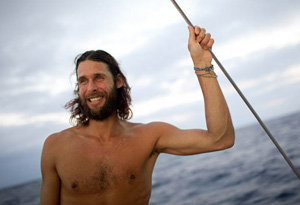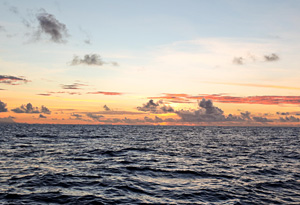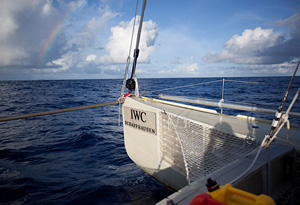Planet Ocean

Photo: Luca Babini
Is Earth the correct name for a planet that's mostly made of water? David de Rothschild—expedition leader of the Plastiki, a boat made of 12,500 recycled plastic bottles—ponders that question and more while floating across the Pacific.
Over the last few months, day in and day out, I've been breathing, sleeping and eating all things blue aboard the Plastiki. You might just call it a severe case of ocean on the brain—but I wouldn't describe it as an ailment. Instead, it's a humbling experience, a blessing that's allowed me to let the oceans—in all their majestic glory—preoccupy every aspect of my thoughts, to seep into every inch of my imagination and to become infused into every fiber of my being.I've floated on 14,000-foot-deep layers of it. I've viewed 360 degrees of it. I've definitely swallowed far more than I would like of it! All of which has helped me to become far more deeply and intensely connected with our oceans, which is why I can't help but think whoever named our planet was guilty of a terrible oversight. Surely "Earth" should really be known as "Ocean."
Think this is just the biased opinion of one recently converted land crab? You can't ignore the fact that salt water covers 72 percent of our planet's surface. The Pacific Ocean, on its own, is larger than the entire landmass of all the continents and subcontinents and innumerable islands combined. Put simply, whichever way you want to slice it, we are all part-ocean. In basic terms:
- No oceans = No place to hide the 41 percent of carbon that is so conveniently and fortunately absorbed by our oceans.
- No oceans = No protein supply to one-fifth of the world's population.
- No oceans = No home for the estimated 50 to 80 percent of all life on earth that lives under the surface of our oceans.
- No oceans = No place for the swordfish and the marlin, the fastest fish in the ocean, to reach their top speed of up to 75 miles per hour.
- No oceans = No deep water currents like the Gulf Stream that help keep our planet's climate livable!
- No oceans = No place for our largest living structure on earth to inhabit and, in turn, be able to have the perfect conditions for the 400 species of coral, more than 2,000 species of fish and 4,000 species of mollusks and other invertebrates that call the Great Barrier Reef their home.
- No ocean = No possibility of matching the astonishing fact that a mouthful of salt water contains millions of bacterial cells, hundreds of thousands of phytoplankton and tens of thousands of zooplankton, all of which might just hold the missing pieces of the puzzle that our future may depend on for survival.

Photo: The Plastiki Crew
In fact, I could easily and effortlessly keep on churning out staggering statistics and facts, all of which reinforce why our oceans are unique and priceless and why World Ocean Day—designated as June 8 of each year—is not only so important but must become more than just one day! However, what I can't keep on doing without feeling a heavy heart and a sense of despair, is to try to explain the reasons for our general disconnect from our oceans. Or why every year we allow toxins and waste weighing three times that of all fish caught to end up in our oceans. Or how during the ecological apocalypse unfolding in the Gulf of Mexico right in front of our very eyes, the initial commentary seemed to be more concerned about the price of BP stock, rather than articulating how the tragedy poses an existential threat to millions of marine animals—that is, if they are not already dead. Multiple ecosystems have been irreversibly devastated at the hands of a situation that could probably best be summed up with four words: greedy, stupid, egomaniacal and unnecessary.
Even more upsetting—and unnecessary—is the fact that there are millions of tiny oil spills that pollute our oceans every day. We allow more oil than was spilled into Prince William Sound by the Exxon Valdez to reach our oceans every year as a result of leaking automobiles, big industry run-off and other nonpoint sources.
The harm we commit against water doesn't stop there. I can't even comprehend how we continue to justify the slaughter and mutilation of millions of dolphins and marine mammals in tuna purse seine nets, or ignore the estimated 44,000 albatrosses that are killed each year by tuna long liners. A modern factory supertrawler can be longer than a football field and can drag a trawl net that could encircle more than a dozen Boeing 747 jumbo jets at its opening. These floating super-slaughter centers are capable of catching and processing up to 200 tons of fish a day.
What is it that possesses us to go to war with our oceans and, for that matter, with Mother Nature herself...and anything else that has to try and share this planet with us? Have we created a dangerous and false dichotomy of nature versus humanity—making nature just an external commodity that we can command, and must conquer? Or maybe we've had our foresight and common sense obscured by an addiction to consumption and growing faster, bigger and cheaper? Or could it possibly be that, as a species, we still believe in the endless horizon and a place called "away"?
Whatever the excuse or the reasoning, it needs to stop fast or it's going to stop our ability to survive even faster. This is why, more than ever, we need to get vocal every day. We need to give Mother Nature her voice back, give her a chance to breathe if we want to keep breathing.
Even more upsetting—and unnecessary—is the fact that there are millions of tiny oil spills that pollute our oceans every day. We allow more oil than was spilled into Prince William Sound by the Exxon Valdez to reach our oceans every year as a result of leaking automobiles, big industry run-off and other nonpoint sources.
The harm we commit against water doesn't stop there. I can't even comprehend how we continue to justify the slaughter and mutilation of millions of dolphins and marine mammals in tuna purse seine nets, or ignore the estimated 44,000 albatrosses that are killed each year by tuna long liners. A modern factory supertrawler can be longer than a football field and can drag a trawl net that could encircle more than a dozen Boeing 747 jumbo jets at its opening. These floating super-slaughter centers are capable of catching and processing up to 200 tons of fish a day.
What is it that possesses us to go to war with our oceans and, for that matter, with Mother Nature herself...and anything else that has to try and share this planet with us? Have we created a dangerous and false dichotomy of nature versus humanity—making nature just an external commodity that we can command, and must conquer? Or maybe we've had our foresight and common sense obscured by an addiction to consumption and growing faster, bigger and cheaper? Or could it possibly be that, as a species, we still believe in the endless horizon and a place called "away"?
Whatever the excuse or the reasoning, it needs to stop fast or it's going to stop our ability to survive even faster. This is why, more than ever, we need to get vocal every day. We need to give Mother Nature her voice back, give her a chance to breathe if we want to keep breathing.

Photo: Luca Babini
How can we regain some harmony among all this ecological madness? Luckily, there seems to be, for want of a better word, a sea change happening. We have visionaries and ocean pioneers like Sylvia Earle and her Mission Blue campaign and Enric Sala of the National Geographic-backed Ocean Now campaign—both of which are fighting back on behalf of our oceans and its inhabitants.
But what if we were to take awareness one stage further? What if the United Nations created a legal framework that actually offered nature some real protection? What if we made the mass destruction of ecosystems an international crime against peace—similar to genocide and crimes against humanity—to be tried at the International Criminal Court? Imagine the profound effect it would have on big industries blamed for widespread damage to the environment.
This radical idea is the brainchild of British environmental lawyer Polly Higgins. Her vision uses a simple equation: Extraction leads to ecocide which leads to resource depletion which leads to conflict. However, it wouldn't stop there: Ecocide would include damage done to any species. Under an ecocide law, you would see prosecutions against individuals rather than just the companies. In turn, you then might just see traditional energy companies having to become largely clean-energy companies, or extractive mining groups would have to either be scaled back massively or stopped. Chemicals that contaminate soil and water and kill wildlife would also have to be abandoned. And large-scale deforestation would not be possible at all.
The potential impact of this could be more than monumental. Especially as it's these types of visionary projects that keep me positive, inspired and driven that we are soon not only going to see an increase in awareness bubbling to the forefront of the collective consciousness, but also to see some really exciting real-world solutions and legislation coming online. Ultimately, this can only help build toward a happier and healthier ocean, nature, planet and humanity.
British explorer David de Rothschild is the expedition leader of the Plastiki—a transoceanic sailboat made of 12,500 recycled plastic bottles. Learn more at ThePlastiki.org and make a Plastiki pledge at MyPlastiki.com.
Are you concerned for our oceans? Share your comments below.
Keep Reading:
David takes on the plastic clogging our oceans
Take an exclusive photo tour of the Plastiki—and meet the crew
Learn more about the Plastiki's mission
But what if we were to take awareness one stage further? What if the United Nations created a legal framework that actually offered nature some real protection? What if we made the mass destruction of ecosystems an international crime against peace—similar to genocide and crimes against humanity—to be tried at the International Criminal Court? Imagine the profound effect it would have on big industries blamed for widespread damage to the environment.
This radical idea is the brainchild of British environmental lawyer Polly Higgins. Her vision uses a simple equation: Extraction leads to ecocide which leads to resource depletion which leads to conflict. However, it wouldn't stop there: Ecocide would include damage done to any species. Under an ecocide law, you would see prosecutions against individuals rather than just the companies. In turn, you then might just see traditional energy companies having to become largely clean-energy companies, or extractive mining groups would have to either be scaled back massively or stopped. Chemicals that contaminate soil and water and kill wildlife would also have to be abandoned. And large-scale deforestation would not be possible at all.
The potential impact of this could be more than monumental. Especially as it's these types of visionary projects that keep me positive, inspired and driven that we are soon not only going to see an increase in awareness bubbling to the forefront of the collective consciousness, but also to see some really exciting real-world solutions and legislation coming online. Ultimately, this can only help build toward a happier and healthier ocean, nature, planet and humanity.
British explorer David de Rothschild is the expedition leader of the Plastiki—a transoceanic sailboat made of 12,500 recycled plastic bottles. Learn more at ThePlastiki.org and make a Plastiki pledge at MyPlastiki.com.
Are you concerned for our oceans? Share your comments below.
Keep Reading:
David takes on the plastic clogging our oceans
Take an exclusive photo tour of the Plastiki—and meet the crew
Learn more about the Plastiki's mission



